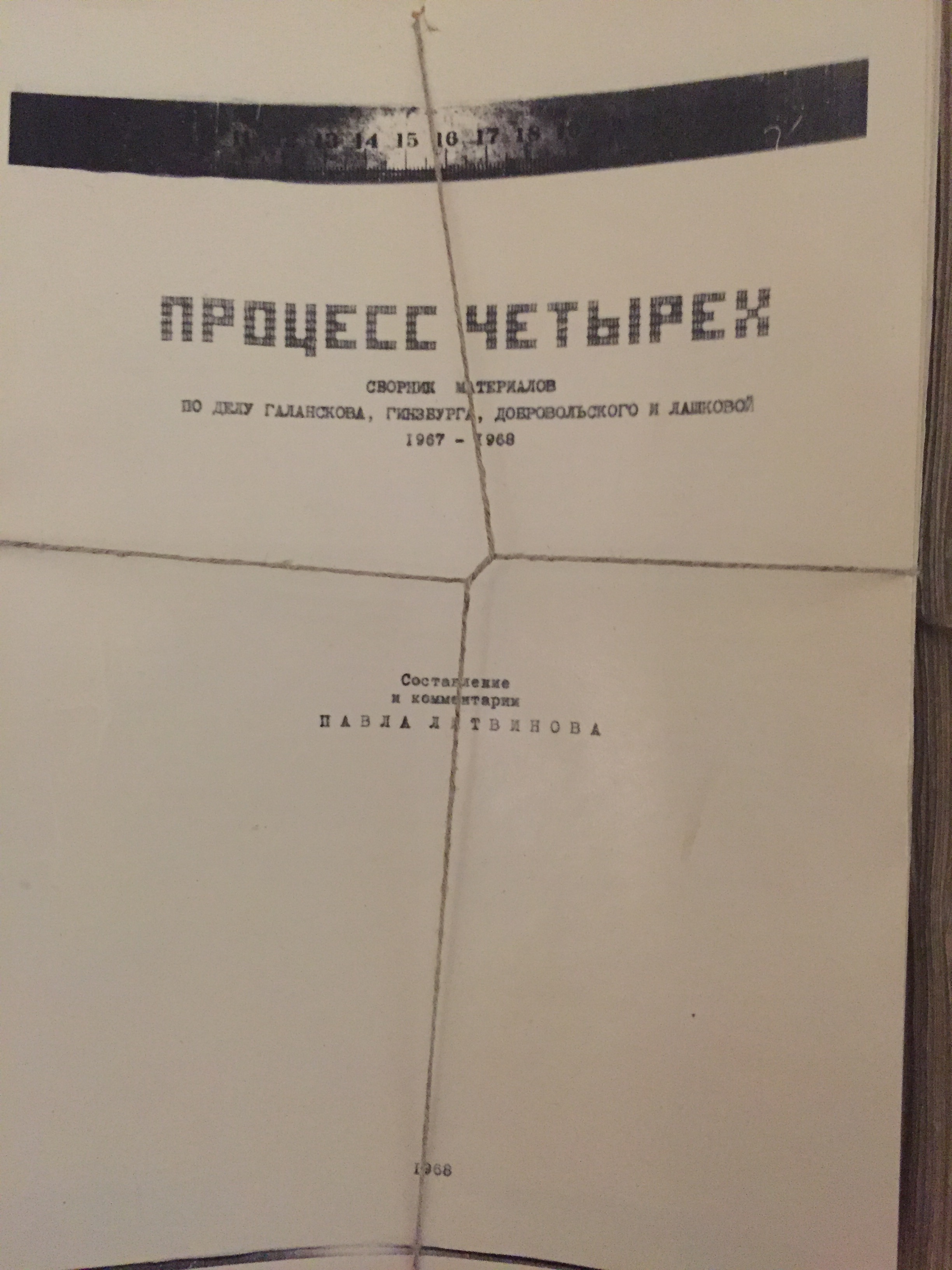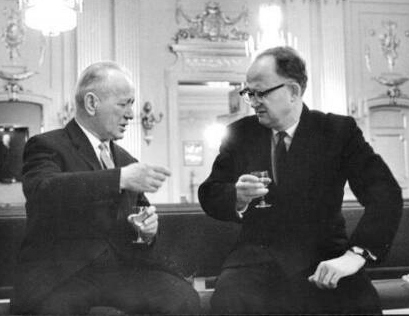|
Trial Of The Four
The Trial of the Four, also Galanskov–Ginzburg trial, was the 1968 trial of Yuri Galanskov, Alexander Ginzburg, Alexey Dobrovolsky and Vera Lahkova for their involvement in samizdat publications. The trial took place in Moscow City Court on January 8–12. All four defendants were sentenced to terms in labour camps. The trial played a major part in consolidating the emerging human rights movement in the Soviet Union. Defendants Yury Galanskov was a second-year student at the Historical Archives Institute and worked at the State Literary Museum in Moscow. From 1959 onwards he took part in readings by young poets in Mayakovsky Square. His poems were published in '' Sintaksis'', a typescript poetry anthology edited by Alexander Ginzburg. In 1966, Galanskov compiled and issued the typewritten literary collection '' Phoenix-66''. Alexander Ginzburg was a first-year student at the Historical Archives Institute who also worked at the State Literary Museum. In 1959–1960 he helped ... [...More Info...] [...Related Items...] OR: [Wikipedia] [Google] [Baidu] |
Moscow
Moscow ( , US chiefly ; rus, links=no, Москва, r=Moskva, p=mɐskˈva, a=Москва.ogg) is the capital and largest city of Russia. The city stands on the Moskva River in Central Russia, with a population estimated at 13.0 million residents within the city limits, over 17 million residents in the urban area, and over 21.5 million residents in the metropolitan area. The city covers an area of , while the urban area covers , and the metropolitan area covers over . Moscow is among the world's largest cities; being the most populous city entirely in Europe, the largest urban and metropolitan area in Europe, and the largest city by land area on the European continent. First documented in 1147, Moscow grew to become a prosperous and powerful city that served as the capital of the Grand Duchy that bears its name. When the Grand Duchy of Moscow evolved into the Tsardom of Russia, Moscow remained the political and economic center for most of the Tsardom's history. When th ... [...More Info...] [...Related Items...] OR: [Wikipedia] [Google] [Baidu] |
Supreme Soviet Of The Soviet Union
The Supreme Soviet of the Union of Soviet Socialist Republics ( rus, Верховный Совет Союза Советских Социалистических Республик, r=Verkhovnyy Sovet Soyuza Sovetskikh Sotsialisticheskikh Respublik) was, beginning in 1936, the most authoritative legislative body of the Soviet Union, Union of Soviet Socialist Republics (USSR), and the only one with the power to approve Constitution of the Soviet Union, constitutional amendments. Prior to 1936, the Congress of Soviets of the Soviet Union, Congress of Soviets was the supreme legislative body. During 1989–1991 Congress of People's Deputies of the Soviet Union, a similar, but not identical structure was the supreme legislative body. The Supreme Soviet elected the USSR's Head of state#Multiple or collective heads of state, collective head of state, the Presidium of the Supreme Soviet, Presidium; and appointed the Council of Ministers of the Soviet Union, Council of Ministers, the Supre ... [...More Info...] [...Related Items...] OR: [Wikipedia] [Google] [Baidu] |
Sofiya Kalistratova
Sofia ( ; bg, София, Sofiya, ) is the capital and largest city of Bulgaria. It is situated in the Sofia Valley at the foot of the Vitosha mountain in the western parts of the country. The city is built west of the Iskar river, and has many mineral springs, such as the Sofia Central Mineral Baths. It has a humid continental climate. Being in the centre of the Balkans, it is midway between the Black Sea and the Adriatic Sea, and closest to the Aegean Sea. Known as Serdica in Antiquity and Sredets in the Middle Ages, Sofia has been an area of human habitation since at least 7000 BC. The recorded history of the city begins with the attestation of the conquest of Serdica by the Roman Republic in 29 BC from the Celtic tribe Serdi. During the decline of the Roman Empire, the city was raided by Huns, Visigoths, Avars and Slavs. In 809, Serdica was incorporated into the Bulgarian Empire by Khan Krum and became known as Sredets. In 1018, the Byzantines ended Bulgarian rul ... [...More Info...] [...Related Items...] OR: [Wikipedia] [Google] [Baidu] |
Dina Kaminskaya
Dina Isaakovna Kaminskaya (russian: Ди́на Иса́аковна Ками́нская, 13 January 1919, Yekaterinoslav – 7 July 2006, Falls Church, Virginia) was a lawyer and human rights activist in the Soviet Union who was forced to emigrate in 1977 to avoid arrest. She and her husband moved to the United States. She was born in Yekaterinoslav. The writer Yuli Daniel engaged Kaminskaya as his lawyer when, in December 1965, he was prosecuted with Andrei Sinyavsky, but the state refused to allow her to speak up in court on his behalf. She went on to defend - as far as the Soviet authorities would let her in a legal system designed as an instrument of Soviet power - Vladimir Bukovsky in 1967. She also defended Yuri Galanskov (who would die in a Soviet labour camp), Anatoly Marchenko (who would also die in camp), Larisa Bogoraz and Pavel Litvinov, and the Crimean Tatar activist Mustafa Jemilev. Kaminskaya was prevented from defending Bukovsky in his 1971 trial and Sergei Kova ... [...More Info...] [...Related Items...] OR: [Wikipedia] [Google] [Baidu] |
Propaganda In The Soviet Union
Propaganda in the Soviet Union was the practice of state-directed communication to promote class conflict, internationalism, the goals of the Communist Party of the Soviet Union, and the party itself. The main Soviet censorship body, Glavlit, was employed not only to eliminate any undesirable printed materials but also "to ensure that the correct ideological spin was put on every published item." Under Stalinism, deviation from the dictates of official propaganda was punished by execution and labor camps. Afterwards, such punitive measures were replaced by punitive psychiatry, prison, denial of work, and loss of citizenship. "Today a man only talks freely to his wife – at night, with the blankets pulled over his head," the writer Isaac Babel privately told a trusted friend.Robert Conquest ''Reflections on a Ravaged Century'' (2000) , pp. 101–111. Theory of propaganda According to historian Peter Kenez, "the Russian socialists have contributed nothing to the theoretical ... [...More Info...] [...Related Items...] OR: [Wikipedia] [Google] [Baidu] |
National Alliance Of Russian Solidarists
The National Alliance of Russian Solidarists (NTS; russian: Народно-трудовой союз российских солидаристов; НТС; ''Narodno-trudovoy soyuz rossiyskikh solidaristov'', ''NTS'') is a Russian anticommunist organization founded in 1930 by a group of young Russian anticommunist White emigres in Belgrade, Serbia (then part of Kingdom of Yugoslavia). The organization was formed in response to the older generation of Russian emigres (veterans of the White movement) who were perceived as being stagnant and resigned to their loss in the Russian Civil War. The youth which formed NTS decided to take an active role in fighting against communism by studying the newly emerging Soviet culture, the psyche of a person living in the Soviet Union, and developing a political program based on the concept of solidarism. Political program The solidarist ideology of NTS was built on the Christian understanding of people's collective social responsibility for e ... [...More Info...] [...Related Items...] OR: [Wikipedia] [Google] [Baidu] |
Mikhail Sholokhov
Mikhail Aleksandrovich Sholokhov ( rus, Михаил Александрович Шолохов, p=ˈʂoləxəf; – 21 February 1984) was a Russian novelist and winner of the 1965 Nobel Prize in Literature. He is known for writing about life and fate of Don Cossacks during the Russian Revolution, the civil war and the period of collectivization, primarily in his most famous novel, '' And Quiet Flows the Don''. Life and work Sholokhov was born in Russia, in the "land of the Cossacks" – the Kruzhilin hamlet, part of stanitsa Vyoshenskaya, in the former Administrative Region of the Don Cossack Host. His father, a Russian, Aleksander Mikhailovich Sholokhov (1865–1925), was a member of the lower middle class, at different times a farmer, a cattle trader, and a miller. Sholokhov's mother, Anastasia Danilovna Chernikova (1871–1942), the widow of a Cossack, came from Ukrainian peasant stock (her father was a peasant in the Chernihiv oblast). She did not become literate until a ... [...More Info...] [...Related Items...] OR: [Wikipedia] [Google] [Baidu] |
Intelligentsia
The intelligentsia is a status class composed of the university-educated people of a society who engage in the complex mental labours by which they critique, shape, and lead in the politics, policies, and culture of their society; as such, the intelligentsia consists of scholars, academics, teachers, journalists, and literary writers. Conceptually, the intelligentsia status class arose in the late 18th century, during the Partitions of Poland (1772–1795). Etymologically, the 19th-century Polish intellectual Bronisław Trentowski coined the term ''inteligencja'' (intellectuals) to identify and describe the university-educated and professionally active social stratum of the patriotic bourgeoisie; men and women whose intellectualism would provide moral and political leadership to Poland in opposing the cultural hegemony of the Russian Empire. In pre–Revolutionary (1917) Russia, the term ''intelligentsiya'' (russian: интеллигенция) identified and described the s ... [...More Info...] [...Related Items...] OR: [Wikipedia] [Google] [Baidu] |
Andrei Sinyavsky
Andrei Donatovich Sinyavsky (russian: Андре́й Дона́тович Синя́вский; 8 October 1925 – 25 February 1997) was a Russian writer and Soviet dissident known as a defendant in the Sinyavsky–Daniel trial in 1965. Sinyavsky was a literary critic for ''Novy Mir'' and wrote works critical of Soviet society under the pseudonym Abram Tertz () published in the Western world, West to avoid censorship in the Soviet Union. Sinyavsky and Yuli Daniel were convicted of Anti-Soviet agitation in a show trial, becoming the first Soviet writers convicted solely for their works and for fiction, and served six years at a Gulag camp. Sinyavsky emigrated to France in 1973 where he became a professor of Russian literature and published numerous autobiographical and retrospective works. Early life and education Andrei Donatovich Sinyavsky was born on 8 October 1925 in Moscow, Soviet Union, the son of Donat Evgenievich Sinyavsky, a Russian people, Russian nobleman from Syzran wh ... [...More Info...] [...Related Items...] OR: [Wikipedia] [Google] [Baidu] |
Yuli Daniel
Yuli Markovich Daniel ( rus, Ю́лий Ма́ркович Даниэ́ль, p=ˈjʉlʲɪj ˈmarkəvʲɪtɕ dənʲɪˈelʲ, a=Yuliy Markovich Daniel'.ru.vorb.oga; 15 November 1925 — 30 December 1988) was a Russian writer and Soviet dissident known as a defendant in the Sinyavsky–Daniel trial in 1966. Daniel wrote and translated works of stories and poetry critical of Soviet society under the pseudonyms Nikolay Arzhak ( rus, Никола́й Аржа́к, p=nʲɪkɐˈlaj ɐrˈʐak, a=Nikolay Arzhak.ru.vorb.oga) and Yu. Petrov ( rus, Ю. Петро́в, p=ˈju pʲɪˈtrof, a=Yu Pyetrov.ru.vorb.oga) published in the West to avoid censorship in the Soviet Union. Daniel and Andrei Sinyavsky were convicted of anti-Soviet agitation in a show trial, becoming the first Soviet writers convicted solely for their works and for fiction, serving five years at a Gulag camp and prison. Early life and writing Yuli Daniel was born on 15 November 1925 in Moscow, Soviet Union, the son of the R ... [...More Info...] [...Related Items...] OR: [Wikipedia] [Google] [Baidu] |
Memorial (society)
Memorial ( rus, Мемориал, p=mʲɪmərʲɪˈaɫ) is an international human rights organisation, founded in Russia during the fall of the Soviet Union to study and examine the Human rights in the Soviet Union, human rights violations and other crimes committed under Joseph Stalin's reign. Prior to its dissolution in Russia, it consisted of two separate legal entities, Memorial International, whose purpose was the recording of the crimes against humanity committed in the Soviet Union, particularly during the Stalinist era, and the Memorial Human Rights Centre, which focused on the human rights defender, protection of human rights, especially in conflict zones in and around modern Russia. A movement rather than a centralized organization, as of December 2021 Memorial encompassed over 50 organisations in Russia and 11 in other countries, including Kazakhstan, Ukraine, Germany, Italy, Belgium and France. Although the focus of affiliated groups differs from region to region, they ... [...More Info...] [...Related Items...] OR: [Wikipedia] [Google] [Baidu] |



